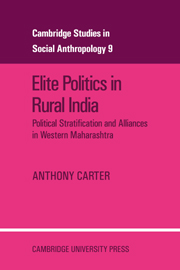 Elite Politics in Rural India
Elite Politics in Rural India from Part I - Introduction
Published online by Cambridge University Press: 02 March 2010
The argument which follows may be understood in the context of two issues of general anthropological relevance. It is a contribution to the study of political stratification and also to the analysis of the relationships between social structure and social organization. At the same time the argument bears on issues peculiar to Western Maharashtra as a distinct region of India. The locality of my investigation, Girvi and Phaltan Taluka, is virtually in the center of Western Maharashtra. It may be assumed that the patterns of political stratification and political alliances found there are illustrative of those occurring throughout the region.
THE LOCALITY: GIRVI AND PHALTAN TALUKA
Girvi is located in Satara District just below the steep north slope of the Mahadev hills in the Nira valley. Consisting of several distinct settlements scattered over an area of twenty square miles (see Map 3, p. 179 and Fig. 2), the village lies along the southern boundary of Phaltan Taluka about six miles from Phaltan town, the taluka headquarters. A motorable dirt road links Girvi proper, the main settlement, to Phaltan and two or three times a day buses of the State Transport Corporation travel from Phaltan to Girvi and back, passing through the neighboring village of Nirgudi on the way. The homes of the residents of Girvi proper together with the principal village temples, the offices of the Panchayat and village co-operative societies, and the market yard are clustered on high ground between two branches of a stream which have their origin in the Mahadev hills a mile or two away.
To save this book to your Kindle, first ensure [email protected] is added to your Approved Personal Document E-mail List under your Personal Document Settings on the Manage Your Content and Devices page of your Amazon account. Then enter the ‘name’ part of your Kindle email address below. Find out more about saving to your Kindle.
Note you can select to save to either the @free.kindle.com or @kindle.com variations. ‘@free.kindle.com’ emails are free but can only be saved to your device when it is connected to wi-fi. ‘@kindle.com’ emails can be delivered even when you are not connected to wi-fi, but note that service fees apply.
Find out more about the Kindle Personal Document Service.
To save content items to your account, please confirm that you agree to abide by our usage policies. If this is the first time you use this feature, you will be asked to authorise Cambridge Core to connect with your account. Find out more about saving content to Dropbox.
To save content items to your account, please confirm that you agree to abide by our usage policies. If this is the first time you use this feature, you will be asked to authorise Cambridge Core to connect with your account. Find out more about saving content to Google Drive.